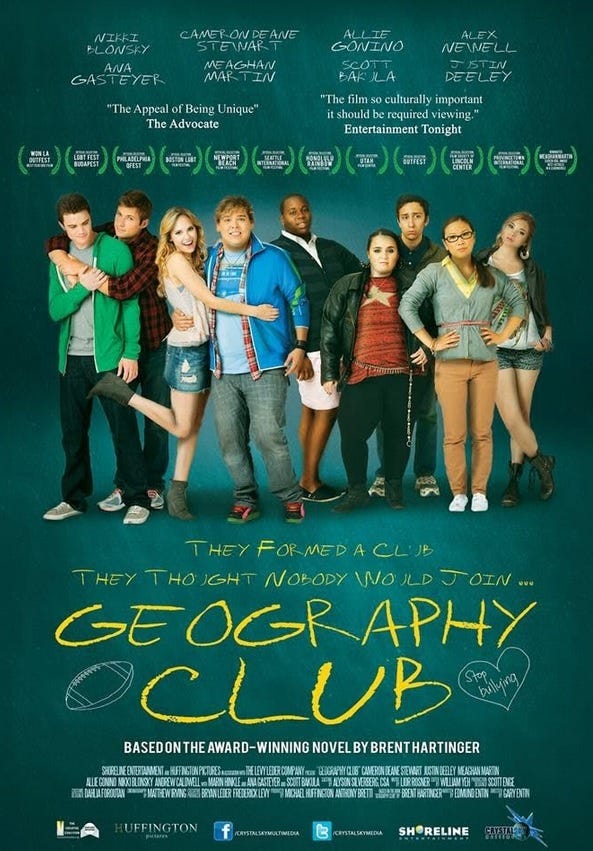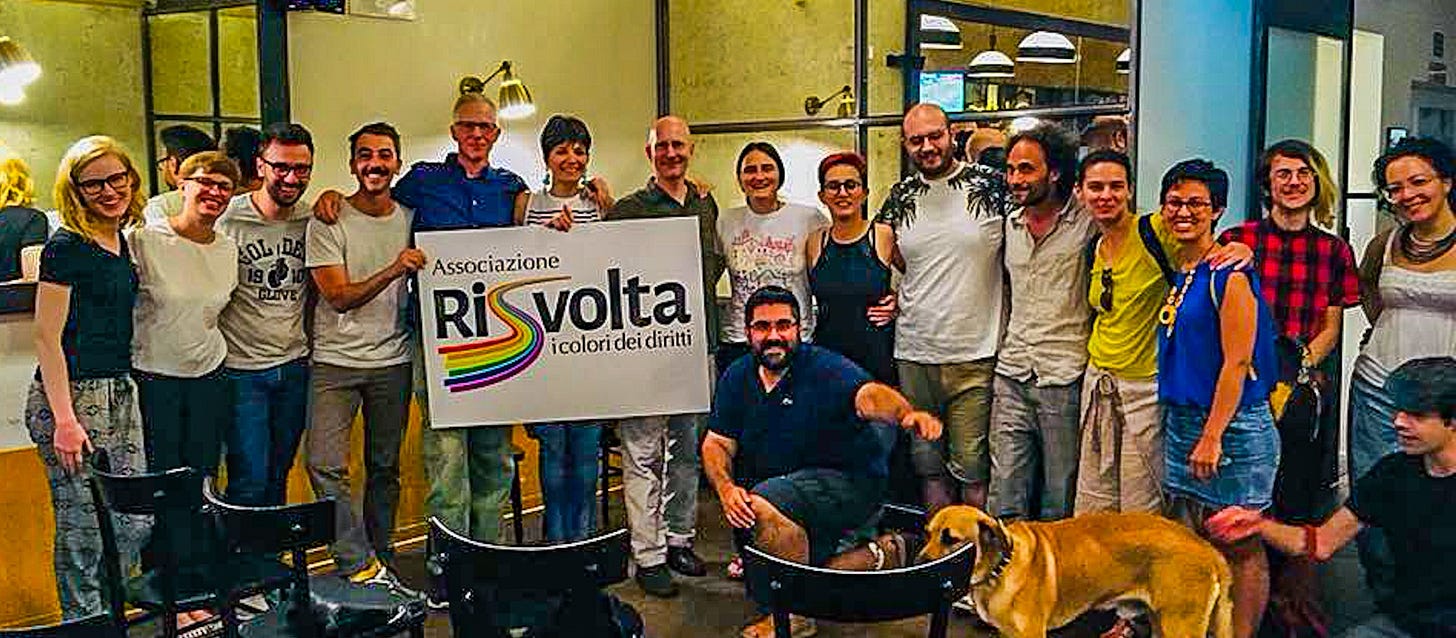Twenty Years Ago, Everyone Thought My Gay Teen Novel Would Flop. They Were Wrong.
My book, Geography Club, changed the world a little tiny bit — and utterly transformed my life.
On March 4rd, 2003, a little over twenty years ago, HarperCollins published my first book, a young adult novel called Geography Club.
I remember the exact date because it was also the day America began bombing Iraq. I was worried for the Iraqis, of course, but I also figured it meant my novel would get no attention whatsoever.
Three days later, my editor called to say, “Good news! We’ve already sold out the first printing, and we need to go into a second printing. And now here’s more good news! Since we decided to do a second printing yesterday, that sold out too, even though it’s not printed yet, and now we need to go into a third printing.”
Why this wasn’t all just one printing, I don’t know, but I was still overjoyed.
After all, my novel was the story of a gay teen at a time when LGBTQ books sold modestly, if they were even acquired by publishers at all. Prior to publication, Geography Club had been rejected some four hundred times, with agents and editors mostly saying the same thing: “We really like this, but there’s just no market for a book about gay teens.”
Even HarperCollins had initially rejected the book, but my editor, Steve Fraser, wouldn’t take no for an answer. Finally, the acquisitions department said to him, “We still don’t think this will sell, but you’re obviously very passionate, so okay, we’ll let you offer Brent a tiny $5000 advance. Will you please leave our office now?”
Everyone in-house at HarperCollins had liked the book — they just thought it wouldn’t sell. Every season, publishers literally rank their books in terms of importance, with “lead title,” “second lead,” and so on.
I referred to my book as “the caboose.”
And now, here it was, an entirely unexpected hit. It would go on to sell over 100,000 copies and eventually be adapted into a 2013 feature film co-starring Scott Bakula, Ana Gasteyer, and Alex Newell.
More importantly, the moment Geography Club was out in the world, I began receiving an absolute deluge of letters and emails from grateful LGBTQ readers, thrilled to see themselves reflected in a book, but also very desperate to share their own personal stories with me.
At the time of all this success, I remember thinking, “All my life I’ve heard authors complain about how hard it is to get attention for their books. But it’s not hard! I didn’t do a damn thing, and here it is, flying off the shelves. Clearly, those other whiny authors just didn’t write good books.”
Later, Karma would enact her sweet revenge when I would go on to write many more novels, most of which I thought were much better than Geography Club, and none of which would break out in the same, effortless way that first book did. A couple would even outright tank. (I did write eight sequels and/or companion novels to Geography Club that all did very well, thank you very much.)
But in my debut year, I was still flying high. In fact, 2003 turned out to be something of a banner year for LGBTQ YA books, all from different publishers. Alex Sanchez published a book called Rainbow High, David Levithan came out with Boy Meets Boy, and Julie Anne Peters released Keeping You a Secret.
There had been YA books about LGBTQ teenagers before 2003, but honestly, not that many, especially from major publishers. And most of them hadn’t made much of a splash, just as my publisher had predicted mine wouldn’t either.
But in 2003, there was something in the air, because Alex, David, Julie, and I all found big success.
Which is ironic, because in 2002, a year after Geography Club sold to HarperCollins but a year before it was released, Alex Sanchez had published his first gay teen book, Rainbow Boys, and I remember thinking, “Well, that’s it! This Sanchez guy has completely stolen my thunder. There’s no way in the world there’s room for two young adult novels about gay teenagers.”
Twenty years later, gay teen fiction is now a vibrant and flourishing genre, with hundreds of annual releases, about all manner of characters in all kinds of genres. These days, I often think, “Are there any YA books that don’t have LGBTQ representation?”
Alex, David, Julie, and myself would all go on to become good friends, frequently seeing each other at conferences and lectures. Once, when I was feeling particularly down about my latest career disappointment, I called Julie to bare my soul. “I’ve never felt so low in my life,” I told her. “What am I doing wrong? Is it me — am I cursed? Or am I just a terrible writer?”
And she scoffed and proceeded to bend my ear for a full hour, explaining that she often felt exactly the way I did then — that almost every professional writer did.
Julie died not long ago, and I still treasure her shockingly frank and extremely comforting words of wisdom.
At the same time, I knew she felt honored and humbled to have written LGBTQ YA at the exact right moment in time. The four of us were all part of a cool little moment in book history — and in LGBTQ rights.
When it comes LGBTQ issues and acceptance, the world has changed so much since 2003. I don’t flatter myself that I’m responsible for even .0000000001% of that change. But by publishing Geography Club — and by co-founding a fairly influential website, AfterElton.com, the following year — I do think I played some small role.
Twenty years on, Geography Club is now very dated. It’s the story of a group of desperate gay and gender-nonconforming teens who create a support group for themselves at their school — and they don’t want anyone else to join, so they give it the most boring name they can think of, the Geography Club.
These days, most LGBTQ American kids don’t need to be so secretive, thankfully, and they often even have the support of understanding adults.
But maybe my book isn’t entirely irrelevant, especially in many foreign countries, which is where I, as a nomad, mostly live these days. Back in 1990, I also helped found one of the world’s first gay-straight alliances, in my hometown of Tacoma, Washington — and now when Michael and I live in more traditional countries, I’m often struck by how similar things seem there to the way America was way back then.
And even in America, the state of LGBTQ rights has taken a very dark turn lately. It’s fueled, as usual, by cynical politicians who seemingly don’t hesitate to traffic in bigotry, openly targeting some of America’s most vulnerable people in order to help their political prospects. That said, I also think some LGBTQ leaders and organizations, like GLAAD, are currently making some spectacularly misguided strategic decisions that are making a very bad situation even worse.
At the end of Geography Club, my main character, Russel Middlebrook, finally finds his place in the world, and he has nothing more to tell his support group — or the reader. “For the first time in my life,” he says, “for the time being at least, I’d already said everything I had to say.”
I’m in a different place. I’m glad I wrote Geography Club, and I really am thrilled and humbled it has touched so many people over the years.
But the world still needs changing. As such, there’s plenty more I have to say.
Brent Hartinger is a screenwriter and author. Check out his other newsletter about his travels at BrentAndMichaelAreGoingPlaces.com.







Yes, I have been trying. I have two finished fantasy novels now, and Patti Lee Gauch (used to run Philomel) has become a fan and is trying to do what she can, but editors who say they will read it never get back to us. We just fall into black holes. I feel my novels, in their own way, are important, like Geography Club, and the world needs them. So if you have any connections you would be willing to recommend me to, Brent, I would be very grateful.
Yes they were wrong! That book is a great legacy, Brent. It has done so much good. (ps--still working on getting my novels published.)